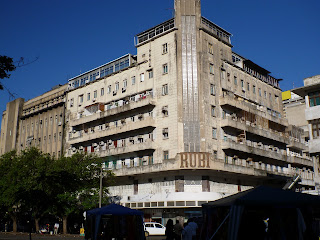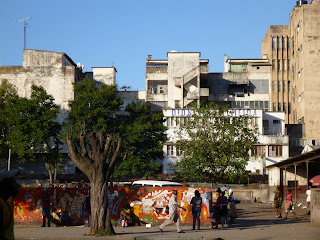 The main street is lined with buildings
which were once incredible examples of colonial architecture but are
now nothing but ruins. Tree roots have pushed through the sidewalks
or the stones have been stolen causing the need to be constantly
watching your feet when what you'd really like to be paying attention
to is the dodgy guy who has been following you for two blocks. Sewer
covers have fallen apart leaving huge holes in the sidewalk which
could put you knee deep in an assortment of rubbish that has
accumulated there over the years. There is no warning. There are no
signs or bright coloured spray paint. Walk at your own risk. Maputo
is a neglected city. What once must have been the pride of colonial
Portugal is now a city struggling to move forward.
The main street is lined with buildings
which were once incredible examples of colonial architecture but are
now nothing but ruins. Tree roots have pushed through the sidewalks
or the stones have been stolen causing the need to be constantly
watching your feet when what you'd really like to be paying attention
to is the dodgy guy who has been following you for two blocks. Sewer
covers have fallen apart leaving huge holes in the sidewalk which
could put you knee deep in an assortment of rubbish that has
accumulated there over the years. There is no warning. There are no
signs or bright coloured spray paint. Walk at your own risk. Maputo
is a neglected city. What once must have been the pride of colonial
Portugal is now a city struggling to move forward.
 There is a sense of desperation in the
people of Maputo. The city is supposedly thriving. It is the
economic capital of Mozambique, one of the fastest developing
countries in the world. After decades of civil war which landed the
country at the bottom of the UN's world development list, Mozambique
is clawing it's way up, digging itself out of poverty but not fast
enough for the people who have moved to Maputo hoping for a better
life and find nothing but unemployment and poor living conditions.
As tourists we become a source of income. As we tour the streets
like walking dollar signs, we become a target for street vendors and
random guys who want to sell. Paintings, small wooden statues,
necklaces, phone cards...there are men, never women, whose only
source of income is peddling to tourists. At the end of the day if
sales have been slow, their tactics become more aggressive because
without a sale, they will not eat dinner. We saw this first hand in
the Fish Market of Maputo.
There is a sense of desperation in the
people of Maputo. The city is supposedly thriving. It is the
economic capital of Mozambique, one of the fastest developing
countries in the world. After decades of civil war which landed the
country at the bottom of the UN's world development list, Mozambique
is clawing it's way up, digging itself out of poverty but not fast
enough for the people who have moved to Maputo hoping for a better
life and find nothing but unemployment and poor living conditions.
As tourists we become a source of income. As we tour the streets
like walking dollar signs, we become a target for street vendors and
random guys who want to sell. Paintings, small wooden statues,
necklaces, phone cards...there are men, never women, whose only
source of income is peddling to tourists. At the end of the day if
sales have been slow, their tactics become more aggressive because
without a sale, they will not eat dinner. We saw this first hand in
the Fish Market of Maputo.
The Fish Market is exactly what it
sounds like. It a market where the locals come to sell their fish
However, with the development of tourism, it has acquired a secondary
function. Tourists are drawn there with the promise of a fresh fish
dinner. Go to the market, pick out a fish and have it cooked for you
in one of the many small restaurants surrounding the market.
The market is a far way out of town and
we made the mistake of walking there our first night in town.
Exhausted by the time we arrived, we were not ready to be accosted by
promoters for the many different restaurants. Each restaurant has a
guy staked at the entrance to the market to latch on to the tourists
and lure them into their restaurant. Not knowing exactly how things
worked we didn't want to commit to anyone and just walked through the
market until we reached a point where surrounded by six different
promoters each claiming to have been the first one to see us, to have
the best restaurant and to be the most honest. My travel companions
were overwhelmed with the pressure and were ready to leave, when one
of the promoters took the hint and suggested that they all leave us
alone and give us some space. “We'll go with him, the guy in the
red shirt.” Decision made, the rest just drifted away.
Our promoter was Gasper and he turned
out to be wonderful. He led us to the restaurant, got us some drinks
and helped us to navigate the process. We had such a wonderful time
that we decided to return on our last night in Maputo. Armed with
the knowledge of how things worked, knowing which restaurant we
wanted to go to and having arrived by tuk-tuk, the second visit to
the market was far less stressful. Upon arriving at the restaurant
Gasper gave us a warm welcome, found us a seat and set to making us
feel completely at home. It was late Sunday afternoon, there was
music playing and the place was filled with locals. It was the place
to be. However, this also meant that we were more of a target for
the salesmen who patrol the market looking for potential purchasers.
This became a bit of a joke as we were subjected to sales pitch after
sales pitch. “Buy this necklace, I give you a good price.”
“Just look, looking is free.” “My name is Mr. Price, lets make
a deal.” “Today is Sunday, I give you banana price.” Banana
price?
We watched as ridiculous paintings were
paraded past us- various renditions of a half naked woman in a
variety of different dress colours, a picture of two hands with a
child's small foot nestled in between, one we were told was a
picture of Bob Marley's dad Elvis, another of Bob Marley himself.
But my favourite must have been the one of the man kissing a ball
(which may have been a man drinking from a coconut, but art is all in
the interpretation). Needless to say, we didn't buy anything.
As the afternoon wore on and turned
into evening, we were approached by a young man with necklaces who
seemed more desperate than most. It was obvious that most of the men
in the market were doing pretty well- nice clothes, healthy glow.
This man was not. Lacking energy, wearing a worn t-shirt he focused
what energy he had on me. “Please buy some necklaces. There
haven't been many tourists today and I haven't sold anything. I need
money so I can get the bus home. I live in the slums which are far
away and I have to get home. 5 for 100 mets.” His necklaces were
ugly and you never know what is the truth, perhaps this was just this
guys strategy for a sale. He persisted for a while on the verge of
begging when another group of tourists came in and he went off to try
his luck with the new victims.
We were having a great time so dinner
was a lingering affair. We watched the boys try to sell a white man
drums, giving a full demonstration which involved every salesman
giving the drums a try which resulted in a series of interesting
beats, not all actually carrying a rhythm. It was at this point that
we noticed our necklace friend devouring the scraps from the table
beside us. So grateful to have some food he thanked his benefactors
profusely for their generosity. He seemed to come to life. Like a
new man, his energy was renewed, a smile across his face. Food was
good, but it wouldn't help him get home to his family. His
satisfaction was short lived as he resumed the hunt for a sale.
There comes a point in time where you have to recognize just how
blessed we are. Coming from Canada, I've had everything I've ever
wanted. I have more opportunities than I know what to do with and
have never had to beg for food or fight for an honourable life. 100
meticais is the equivalent of 4 dollars. I knew the man would return
to our table, and I knew that I would buy his necklaces, an easy
thing to do to help a human being retain their dignity. This had
gone beyond the scam and had suddenly become quite real. He was a
person in need. A real person, not just someone pestering me during
my dinner.
I am now the proud owner of five ugly
necklaces and as such I was able to make someone's day. As I put the
100 mets in his hand, you could see relief wash over him. He was
going to be able to go home, he was ok for one more day.
And a little person here proudly wears her African necklace almost daily.
ReplyDelete